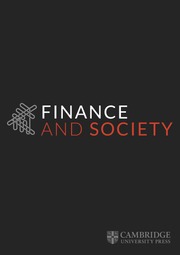Article contents
Luhmann without society
Published online by Cambridge University Press: 09 November 2023
Extract
Konings successfully mobilizes social theory to demonstrate how various post-Marxist, Polanyian, and Foucauldian analyses fail to make sense of financialization and neoliberal governance as persistent societal formations. In their place he offers an analysis focused on the logic of ‘leverage’, which he sees as a source of not only private gain but also governmental power. I fully endorse Konings' turn to social theory, and in particular to the work of Niklas Luhmann. But I suggest that, since Konings leaves out Luhmann's broader theory of society, he can neither capture the tight couplings between the economy and politics presupposed in neoliberal governance, nor contextualize this governance as a ‘provincial’, US-centred project.
- Type
- Forum: Capital and time
- Information
- Creative Commons
- This is an Open Access article, distributed under the terms of the Creative Commons Attribution-NonCommercial-No Derivatives licence (http://creativecommons.org/licenses/by-nc-nd/4.0/), which permits noncommercial re-use, distribution, and reproduction in any medium, provided the original work is unaltered and is properly cited. The written permission of Cambridge University Press must be obtained for commercial re-use or in order to create a derivative work.
- Copyright
- © 2018 The Author(s)
References
- 1
- Cited by




